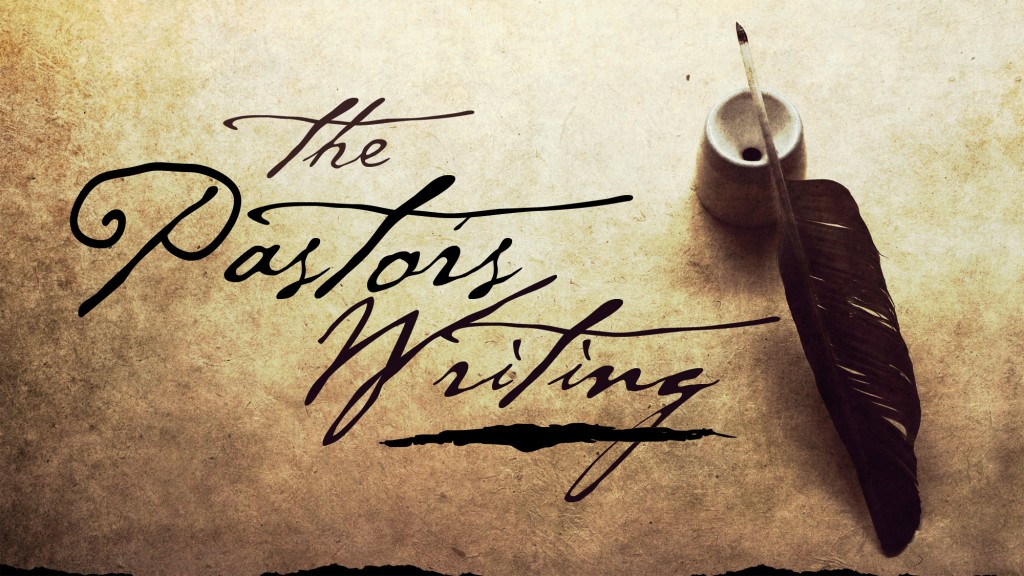I am increasingly convinced that the discipline of writing is one of a pastor’s best friends. It promotes clarity of thought, winsomeness with words, and power in persuasion.
Consider these statements from prominent pastor-theologians in the Reformed tradition:
Citing Augustine, John Calvin said, “I count myself one of the number of those who write as they learn and learn as they write.” John Piper said, “Writing became the lever of my thinking and the outlet of my feelings. If I didn’t pull the lever, the wheel of thinking did not turn. It jerked and squeaked and halted. But once a pen was in hand, or a keyboard, the fog began to clear and the wheel of thought began to spin with clarity and insight.”1
In many ways, the only reason I started this blog was to force myself to write with regularity. My hope is the regularity will do two things: 1) help me to write better, and 2) help me to find my own voice. I think of a pastor’s writing voice much like his preaching voice: it takes a long time to discover it2 and a lifetime to hone it.
D.A. Carson once said, “If you listen to only one preacher, you become a clone. If you listen to two, you become confused. If you listen to fifty, you’re on the edge of wisdom and beginning to become yourself.” I think you can apply the same thing to reading and writing: “If you read only one writer, you become a clone. If you read two, you become confused. If you read fifty, you’re on the edge of wisdom and beginning to become yourself.”
So what I want to do in this post is give you a peek into how I try to put my spin on Carson’s maxim into practice. I hope it will encourage you to something similar as you find/solidify/sharpen your writing style and voice.3
READING THAT SHAPES WRITING
I read John Frame and Tom Schreiner for accessibility. I am amazed at how these men can write expansive systematic and biblical theologies with such simplicity and clarity. Their works steer clear of the verbosity that so often comes out of the academy, which serves the ordinary person in the pew. Reading Frame and Schreiner will show a pastor how to write on complexity without complexity.
- Suggested Starting Places: Frame’s Salvation Belongs to the Lord and Schreiner’s Magnifying God in Christ.
I read the Puritans for particularity. The Puritans were masters of nuance, distinction, and definition. When talking about God’s power they speak of His absolute power and ordained power. When speaking about God’s love for man, they make a distinction between God’s benevolent love and complacent love. Their theological distinctions can be so minute they run the risk of being helpful. But on the whole, their particularity in discourse is overwhelmingly useful. Anyone who has engaged in theological discussion knows the necessity of precision, and the Puritanism is something of a synonym for precision. Their particularity is seen not only in their doctrinal instruction, but also their heartfelt application. Every doctrine would be applied to specific heart conditions, a fact that writers would be wise to consider for a diversity of people will read any given work.
- Suggested Started Places: Owen’s Communion with God and Bolton’s The True Bounds of Christian Freedom.
I read the Wilsons for dexterity. By Wilsons I am thinking of Doug and Nate Wilson. This father and son duo has a facility with language and prose that regularly astonishes me. I will never write as well as they do, but I am always inspired with their skill in crafting sentences and wielding words with power, passion, and conviction.
- Suggested Starting Places: Doug’s Future Men and Nate’s Death By Living.
I read history for sensitivity. No person wants to be accused of “chronological snobbery” in their writing or ministry. Broad historical reading helps one be sensitive to the ebbs and flows of culture. The best historian are storytellers, therefore a glorious consequence of reading good history is that you get to see how a story is told well. So historical reading helps generate sensitivity to the progress of man and the progress of a good plot line.
- Suggested Starting Places: Hillenbrand’s Unbroken and Shirer’s The Rise and Fall of the Third Reich.
I read fiction for curiosity. Good fiction excites interest – curiosity – for a variety of reasons. It can be suspense, angst, pain, joy, or any other emotion. Every person who writes wants to write compellingly and good fiction encourages that kind of writing.
- Suggested Starting Places: Rowling’s Harry Potter series and Tolkien’s Lord of the Rings.
Strategic reading will help shape your writing. Who is influencing your writing voice?
- HT: Justin Taylor, “On Writing Well: Four Suggestions.” ↩
- I would say it took five years of somewhat regular preaching before I hit my personal stride in oral communication. ↩
- Check out the bottom of this post from Tony Reinke to see how he did something similar when writing his first book. ↩

